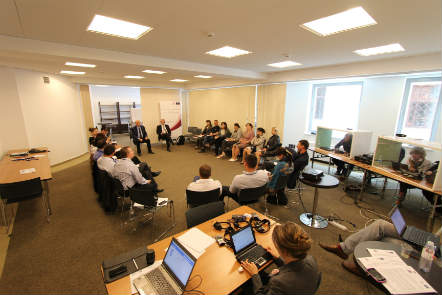Working together for penitentiary reform
The first training courses for “Integrated Care for Drug-using Inmates in Therapeutic Communities” targeting the future therapeutic community staff took place in Chisinau, 25-28 May 2015. At the end of the training the participants received a personal certificate for acquiring the basic knowledge to act as staff in a therapeutic community. Two more training courses will be run in 2015 and 2016 in order to complete the professional training of Moldovan prison staff and NGO representatives working in prisons. The project also foresees the refurbishment of the prison wards where the therapeutic community beneficiaries will live.
 |
 |
 |
Under the CoE/EU Eastern Partnership Programmatic Cooperation Framework (PCF), 2015-2017 the Pompidou Group are implementing this project “Criminal Justice Responses to Drug Dependent Prisoners” in Armenia, Georgia, the Republic of Moldova and Ukraine.
The main expected results of the project in the Republic of Moldova are: national policies and services concerning drug treatment in prisons are reviewed and improved; two pilot therapeutic communities are established in two prisons (male and female prison); more than 30 prison staff and health care workers are trained as multipliers. The direct beneficiaries of this project are more than 50 drug dependent prisoners per year after the opening of the therapeutic communitiess. Together with the Norwegian NGO Phoenix Haga, the Pompidou Group will support the Moldovan partners to develop two therapeutic communities by 2017, one in a female prison (Rusca) and one in a male prison (Pruncul).
Moldova has a significant HIV epidemic which is particularly concentrated among certain sub-populations, such as injecting drug users. HIV prevalence among the general population is currently 0.37%. As of May 1, 2013, a cumulative number of 7,928 HIV cases were registered. In the Republic of Moldova there are more drug users in prisons than in the community and drug use in prison settings poses a major problem.
Moldova sets a positive example in the field of harm reduction and the treatment of addiction. The government has launched a programme which includes the detection of HIV infection, monitoring of HIV cases, needle and syringe exchange programmes and opiate substitution treatment (OST) for prisoners. The representatives of the Department of Penitentiaries (DPI) have stressed their commitment to complement existing harm reduction intervention through psycho-social support. The Republic of Moldova issued a formal request in June 2013 asking the Pompidou Group for assistance in establishing two Therapeutic Communities (TCs) in their prisons. They were interested in extending their tool kit in the fight against drug dependence in their prisons and in the community by adding more psycho-social support programmes to their drug treatment system.
What are therapeutic communities? They are a potent and well-developed methodology for treating drug addiction. It is a methodology that has been introduced worldwide and modified to suit local cultures and traditions. It has also been modified to fit different target groups. The methodology contains a large set of interventions to help the client change from an addictive lifestyle to a lifestyle without drugs. The therapeutic community is a micro-society where clients are living 24/7 and experience all aspects of life challenges in a safe environment. The client has an opportunity to investigate the challenges and to change his or her perception and behaviour in response to this challenge. Therapeutic communities have been proved to be the most potent methodology for treating addiction and can show up to 70% success rate in treatment outcome. Some basics in a therapeutic community: mutual self-help/common philosophy/common values/a daily schedule/clear responsibilities/hierarchic structure/role modelling/clear expectations.


